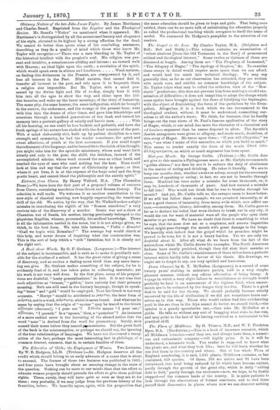Obituary Notices of the late John James Tayler. By James
3Iartinean and Charles Beard. Reprinted from the inquirer and the Theological Review. Mr. Beard's "Notice" we mentioned when it appeared. Mr. Martinean's is distinguished by all the accustomed beauty and eloquence of his style, elevated to its highest by a strong affection for the dead. We cannot do better than quote some of his concluding sentences, describing as they do a quality of mind which those who know Mr. Taylor will recognize:—" There was a rare blending in Mr. Tayler of the historical intellect with the prophet's soul. His religion was pre- sent and intuitive, a consciousness abiding and intense ; an inward walk with Heaven; an ideal light upon the earth ; a revelation of the spirit, which would speak even in silence and loneliness Weak natures, on finding this divineness in the Present, are overpowered by it, and lose all interest in the Past. Blind natures, that cannot find it, transfer all interest to the past, and rely upon it to bequeath them a religion else impossible. But Mr. Tayler, with a mind pos- sessed by the divine light and life of to-day, simply bore it with him into all the ages to show the way, and shine upon the hid- den beauties, and wake up the inner meanings, of the story of humanity. The same pity, the same honour, the same indignation, which he brought to the sorrow, the endurance, and the wrongs of the present hour, went with him into the drama of other times, and gave him friendships and aversions through a hundred generations of the dead, and turned his memory into a portrait-gallery of saintly and heroic men With all his learning, no one could be loss bookish and pedantic, and have the fresh springs of his nature less choked with the dead remains of the past. With tr mind elaborately rich, built up by patient discipline to a rare strength and symmetry, he had the tender conscience, the quick and sweet affections, of youth at the first sacrament. If you could forget the refinement of his language, and be insensible to the finish of his thought, you might take him for the apostolic missionary, whose soul went forth utterly and only to the poor, the child, the stricken, instead of the accomplished scholar, whose word crossed the seas on either hand, and reached the eyes of men who read nothing but the host. None could look at him and say that the power of Christianity is spent; or that, where it yet lives, it is at the expense of the large mind and the deep poetic heart, and cannot blend the philosophic and the saintly spirit."










































 Previous page
Previous page